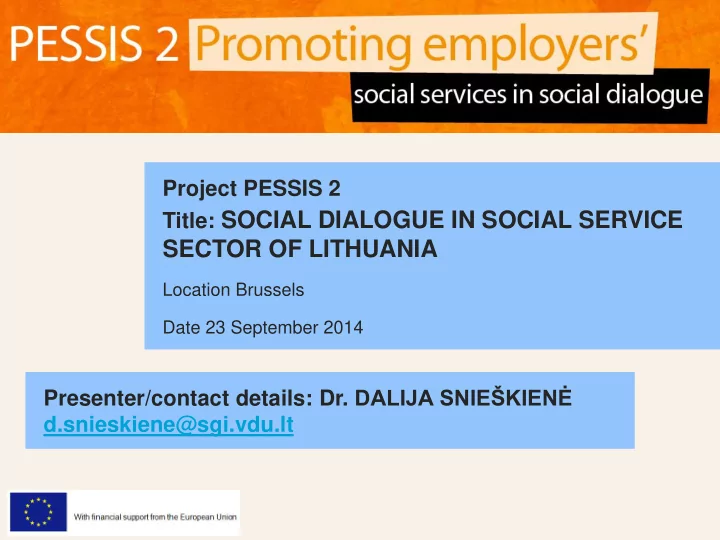

Project PESSIS 2 Title: SOCIAL DIALOGUE IN SOCIAL SERVICE SECTOR OF LITHUANIA Location Brussels Date 23 September 2014 Presenter/contact details: Dr. DALIJA SNIEŠKIENĖ d.snieskiene@sgi.vdu.lt
Goal of the presentation - to highlight the key points of social dialogue in the social service sector in Lithuania: • Profile of social service sector; • Social dialogue arrangements in country and specifically for social service sector; • Representativity: how employers and employees represented in social service sector social dialogue; • Collective bargaining arrangements; • Main issues facing social dialogue in the social service sector in the future.
RESEARCH METHODOLOGY: Case study • Research paper and document analysis. • Interviews with 16 informants from government, employers’, trade unions’ and workers
PROFILE OF SOCIAL SERVICE SECTOR IN LITHUANIA : Financing: increasing expenditure for elderly, families and children ( 2,2 times (2005-2011), but decreasing for people with disabilities (5,3% 2005- 2011). General 5,4% lower than the EU average . Funding of social care institutions increased, but very low accessibility and quality ( 24- 25 position among 27 EU Eurobarometer ) Home care services for elderly and persons with disabilities increased by 7% (2010-2011 ) Workers: 18602 (2012) in all sector, from them ~ 9% direct administration Major trends: Decreasing state care homes, but increasing municipality, NGO and private care homes for elderly and adults with disabilities; D einstitutionalization of substitute child care and adults with disabilities care
SOCIAL DIALOGUE ARRANGEMENTS Regulated by : Constitution of the Republic of Lithuania Code of Labour of the Republic of Lithuania bilateral – between employees and employers , tripartite- bilateral + state authorities Tripartite social dialogue in social services sector involves unions of trade unions and state, any other type of NGO of employees or managers can not participate. Bilateral social dialogue – Federations of trade unions and many local and organization based trade unions or work councils and managers;
REPRESENTATIVITY Managers are represented by: • state (Ministry of Social Security and Labour), • Association of Local Authorities in Lithuania, • Association of Key Personnel and Social Care Institutions for Lithuanian Elderly and Disabled People “Rūpestinga globa” , • Association of Lithaunian Child Care Institutions’Directors . Employees are represented by : • 9 umbrela trade unions; • unnumbered local or organization based trade unions, sometimes few in one institution Only 19 of 33 state run social care institutions have TU and only 1 more than 50% of it’s employees are TU members. One trade union represents interest of various professions in one institution; Soc. service workers from NGO and private for profit institutions are not represented at all.
COLLECTIVE BARGAINING ARRANGEMENTS • Procedures regulated by Code of Labour of the Republic of Lithuania • Signed between employer and trade union or work council. • Collective agreement is only for one organization, did not registered anywhere else. • From 33 state run social care institutions – 17 has collective agreements; • Mainly repeating issues from Code of Labour ( Guidelines for the organizing of remuneration (wages, salaries, premiums, motivational systems, labour standards and other…) Working time and rest periods; Safe and healthy working environment; Training, retraining and related guarantees; Mutual informing and consulting; Other social guarantees; Procedures of company’s collective agreement implementation • Slow expansion in the state run sector – 7 from 17 signed in 2013-14 y. • Try to sing the collective professional agreement between state and organized umbrella trade unions.
Main issues for social dialogue in future : •No representation of employers’ at Tripartite council; • Unclear employers for social service sector at municipality level; • Involvement of NGO and private sector to social dialogue at all levels; • Low competence of trade unions; • Competition among trade unions; • Victimization, fear and low understanding of the rights as employees; • Low and mixed membership among professions in trade unions; • Simulation of social dialogue without any structure: agreements, protocols and etc.
THANK YOU FOR YOUR ATTENTION
Partnership:
Recommend
More recommend